Pharmacognosy
Introduction
Pharmacognosy remains as an ever blooming modern science including phytomedicine, nutraceuticals, herbal cosmetics and plant Bio technology. The plants worldwide used in the treatment of diseases emphasis in all the major system of medicine. Through the discovery, identification, and evaluation of bioactive chemicals with natural origins, it plays a crucial role in the field of pharmaceutical sciences. Discovering new lead compounds and identifying bioactive components are the aims of natural product research. The department involved in the protection of endangered medicinal species as well as isolation of medicinal value compounds from traditional drugs and provides extensive theoretical as well as practical knowledge on preparation of herbariums, pharmacognosy of herbal drugs, extraction, and isolation of secondary metabolites, formulation and standardization of herbal products for undergraduate level. Graduate students are skilled with innovation of new drug molecule from herbal drugs, structural elucidation, docking studies and bio active screening of chemical compounds. Additionally, the department concentrates on quality assurance and the challenges associated with maintaining the safety of traditional medicine. Department has instruments for analysis of herbal drugs like HPTLC, and other basic equipment of extraction.
THRUST AREA OF RESEARCH
- Development of phyto bioactive compounds
- Screening of phytochemicals in natural products and commercial formulation
- Standardisation and bioactivity studies of traditional drugs
- Quality control of botanicals, natural products and marketed formulation
- Profiling of phytochemical components using chromatography.
- Scientific validation of medicinal herbs based on traditional claims.
- Screening of novel plant-based chemical entities
- Standardisation and bioactivity studies of Ayurveda and siddha formulations
- Analysis of a monograph on botanicals and herbal drugs
Vision Mission
VISION :
To explore the potential of natural resources as pharmaceuticals, nutraceuticals & cosmeceuticals.
MISSION :
To establish a unique platform for developing modern dosage forms by utilizing constituents from natural sources through innovative teaching, research and training.
To enrich the students by providing knowledge of modern techniques for isolation, screening & utilization of phytochemicals.
To update the skills of students in identifying & characterizing the constituents of natural resources.
To encourage students for discovering different active moieties from natural sources.
To highlight the importance of drugs from natural origin in the treatment of diseases.
HOD Profile
Name : Dr. E. Thilagam
Qualification : M.Pharm., Ph.D.,
Department : Pharmacognosy
Designation : Professor and Head
Date of Joining : 06.04.1992

Dr. E. Thilagam, M. Pharm., Ph.D., - Professor and Head
|
Field of Specialization |
Pharmacognosy |
|
Phone No. |
9789456750 |
|
|
|
|
Residential Address |
L/57-216, Koottappalli Colony, Koottappalli (PO), Tiruchengode (TK), Namakkal (Dt), Tamil Nadu. 637214 |
|
Experience |
23 years 10 months |
|
Blood Group |
O+ Positive |
Area of Research
- Analytical method development and Validation of
- Pharmacognostical and phytochemical studies of medicinal
- Formulation and standardization of herbal drugs
- In-vitro and In-vivo screening of medicinal plants for pharmacological
- Molecular docking for Natural Products
|
Publication Details : International : |
12 |
|
|
National : |
4 |
|
|
Project details : UG : |
16 |
|
|
Book Published : |
1 |
|
|
Patent Details : |
1 |
|
|
Awards received : |
2 |
|
|
Conference/ Workshop/ Symposium/ Seminar/FDP Attended : |
50 |
|
|
Conference/ Workshop/ Symposium/ Seminar/FDP Conducted : |
2 |
|
|
Resource Person in Conference/ Workshop/ Symposium/ Seminar/FD : |
3 |
|
Membership Details : APTI
Staff
Pharmacognosy remains as an ever blooming modern science including phytomedicine, nutraceuticals, herbal cosmetics and plant Bio technology. The plants worldwide used in the treatment of diseases emphasis in all the major system of medicine. Through the discovery, identification, and evaluation of bioactive chemicals with natural origins, it plays a crucial role in the field of pharmaceutical sciences. Discovering new lead compounds and identifying bioactive components are the aims of natural product research. The department involved in the protection of endangered medicinal species as well as isolation of medicinal value compounds from traditional drugs and provides extensive theoretical as well as practical knowledge on preparation of herbariums, pharmacognosy of herbal drugs, extraction and isolation of secondary metabolites, formulation and standardization of herbal products for undergraduate level. Graduate students are skilled with innovation of new drug molecule from herbal drugs, structural elucidation, docking studies and bio active screening of chemical compounds. Additionally, the department concentrates on quality assurance and the challenges associated with maintaining the safety of traditional medicine. Department has instruments for analysis of herbal drugs like HPTLC, and other basic equipment of extraction.
THRUST AREA OF RESEARCH
- Development of phyto bioactive compounds
- Screening of phytochemicals in natural products and commercial formulation
- Standardisation and bioactivity studies of traditional drugs
- Quality control of botanicals, natural products and marketed formulation
- Profiling of phytochemical components using chromatography.
- Scientific validation of medicinal herbs based on traditional claims.
- Screening of novel plant-based chemical entities
- Standardisation and bioactivity studies of Ayurveda and siddha formulations
- Analysis of a monograph on botanicals and herbal drugs
Gallery
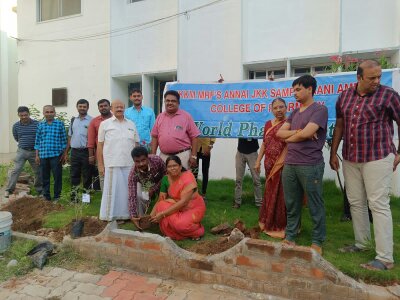 |
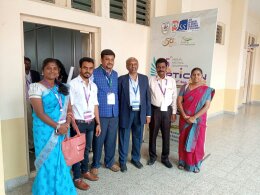 |
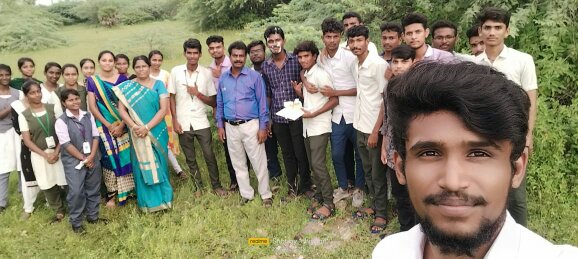 |
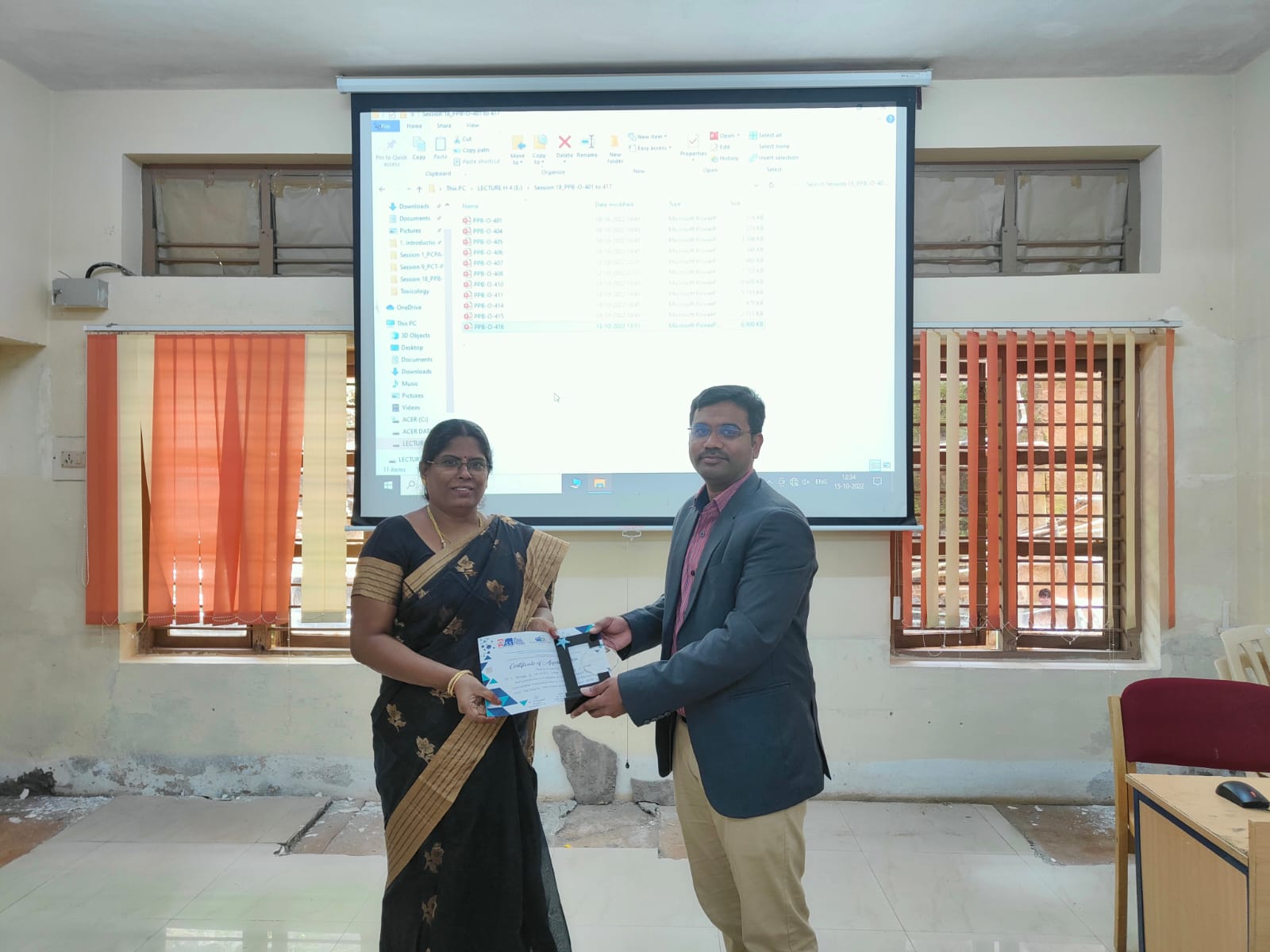 |
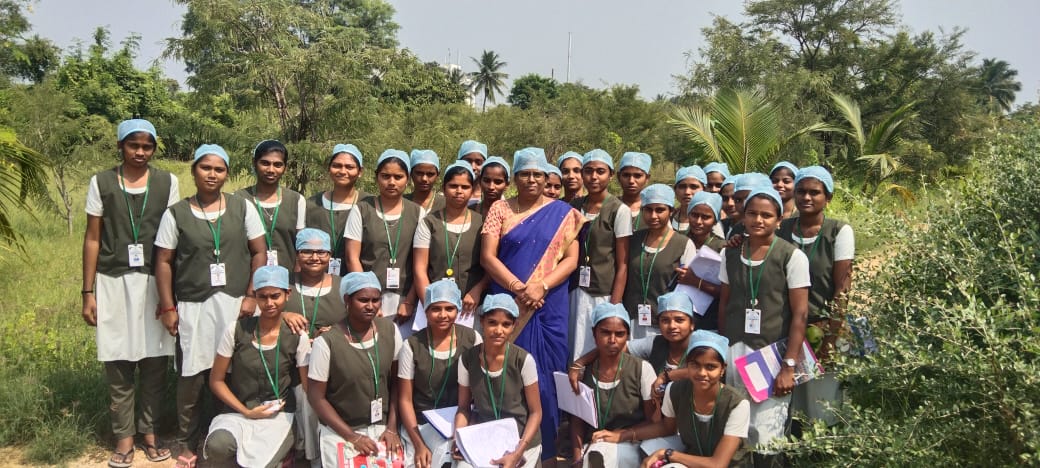 |
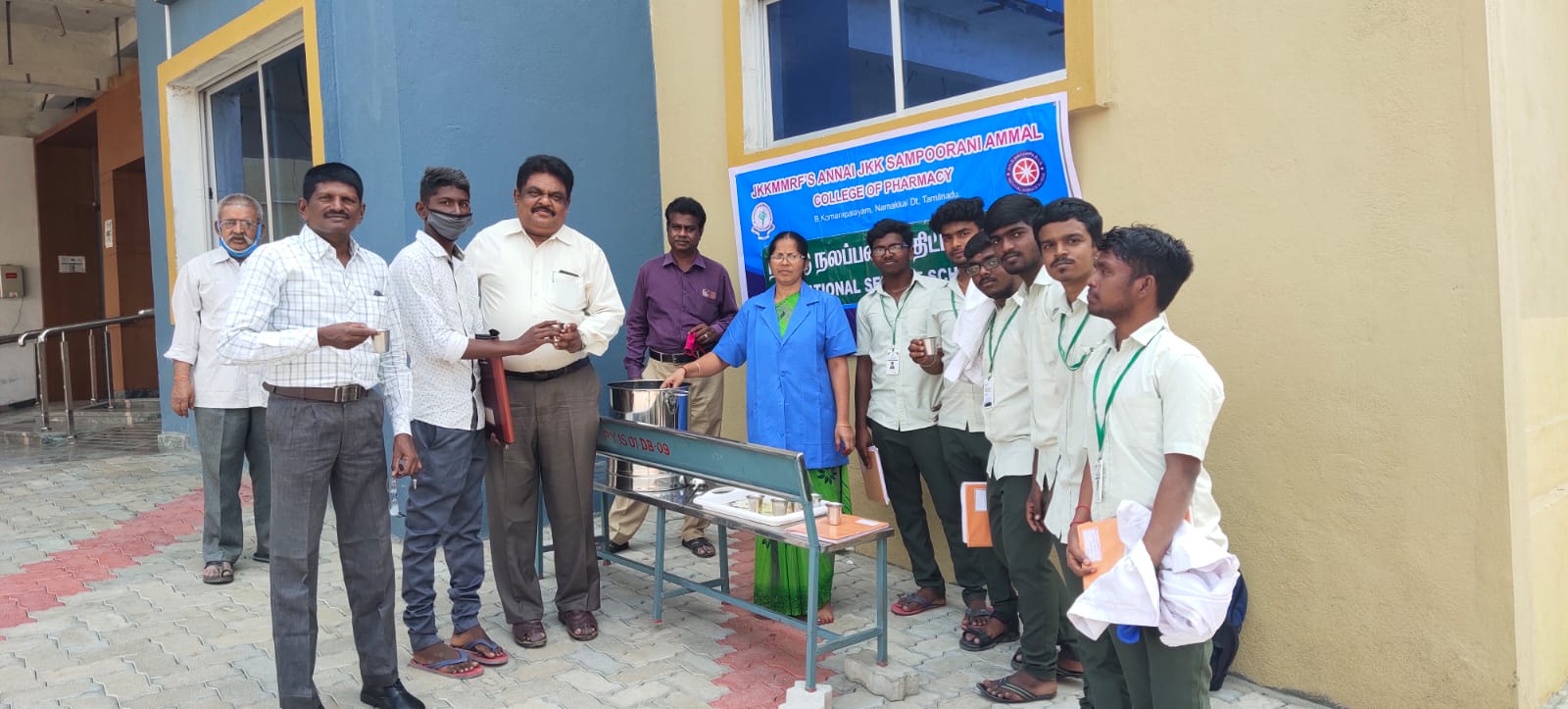 |
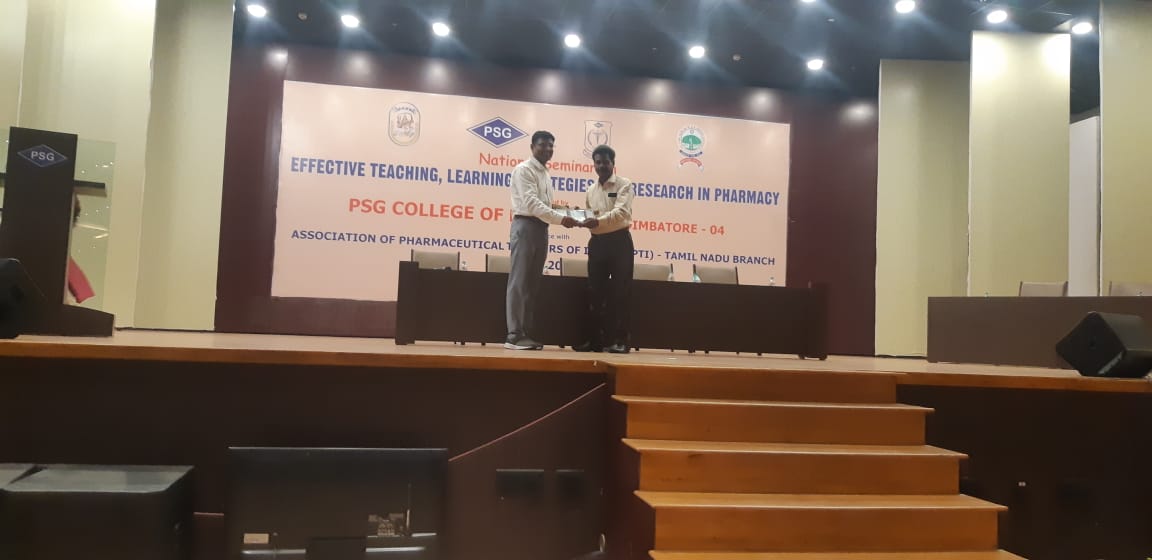 |
Research Area
The department of Pharmacognosy is well equipped for research work. The undergraduates are doing their project works as a Research. In this department are having two doctorate and divided the following research groups to improve the research activities.
Area of Research
- Pharmacognostical and phytochemical studies of medicinal plants
- In-vitro screening for anti-microbial activity.
- In-vitro plant tissue culture techniques.
- Isolation and purification of anti-diabetic and anti-oxidant compounds.
- Formulation and standardizations of herbal products.
- Analytical method development and Validation of Phytoconstituents.
- Pharmacognostical and phytochemical studies of medicinal plants.
- In-vitro and In-vivo screening of medicinal plants for pharmacological activity.
- Molecular docking for Natural Products
Events
Academic Year 2021-2022
|
Date |
Name of the Add on course/ workshop/ seminar |
Details of Resource person with designation |
No. of participants |
|
08.06.2022 |
The analysis of traditional drugs - An Instrumental Approach |
Dr. R.Arivukarasu, Professor and Head, Coimbatore and Dr. E. Thilagam, M.Pharm., Ph.D Professor and Head |
325 |
|
|
Green Cell Factories |
Dr. V. Suresh, M.Pharm., Ph.D Professor and Head and Dr. P. Satheesh Kumar, M.Pharm; Associate professor. |
65 |
|
08.03.2022- 09.03.2022 |
Seminar on Current Scope of Siddha Formulations |
Dr. C.S. Kandasamy, Professor and Head, Coimbatore and Dr. T. Loganathan, Associate professor, Erode
|
340 |
|
08.03.2021 |
Workshop on Homeopathy calculations and dilution |
Dr. R.Arivukarasu, Professor and Head, Coimbatore and Dr. S.Thenmozhi, Professor and Head, Namakkal |
310 |
|
13.12.2021 - 20.12.2021
|
Holistic Medicinal Therapy |
Dr. E. Thilagam, M.Pharm., Ph.D Professor and Head and Mr. A. Srinivasan, M.Pharm Associate professor
|
62 |
Academic Year 2020-2021
|
Date |
Name of the Add on course/ workshop/ seminar |
Details of Resource person with designation |
No. of participants |
|
04.01.2021 - 29.01.2021 |
Prospects Of Traditional Knowledge On Foods & Health Care |
Dr. E. Thilagam, M.Pharm., Ph.D Professor and Head and Dr. P. Satheesh Kumar, M.Pharm; Associate professor. |
65 |
|
21.09.2020 - 25.09.2020 |
Quality Control Of Natural Products |
Dr. E. Thilagam, M.Pharm., Ph.D Professor and Head and Mr. R. Vijay Amirtharaj, M.Pharm Professor |
60 |
Academic Year 2019 - 2020
|
Date |
Name of the Add on course/ workshop/ seminar |
Details of Resource person with designation |
No. of participants |
|
02.04.2020 - 18.04.2020 |
Herbs And Challenging Complications |
Dr. E. Thilagam, M.Pharm., Ph.D Professor and Head and Dr. P. Satheesh Kumar, M.Pharm; Associate professor. |
62 |
|
20.12.2019 |
Plant based drug practice on Contagious diseases |
Dr. K. Vasuki, Professor and Head, Thiruchengode and Dr. P. Satheesh Kumar, M.Pharm; Associate professor. |
320 |
|
02.11.2019 - 30.11.2019 |
Marine Derived Bioactive Agents |
Mr. R. Suresh, M.Pharm Associate professor and Mr. V. Suresh Kannan, M.Pharm Assistant professor |
64 |
|
14.10.2019- 15.10.2019 |
Workshop on Ecopharmacognosy - A Philosophical Approach |
Dr. N. Balakrishnan, Principal, Kanniyakumari and Dr. S.Manokaran, Associate professor, Erode |
340 |
Academic Year 2018-2019
|
Date |
Name of the Add on course/ workshop/ seminar |
Details of Resource person with designation |
No. of participants |
|
07.01.2019 - 25.01.2019
|
Molecular Approaches On Aromatic Plants
|
Mr. P. Satheesh Kumar, M.Pharm; Associate professor and Mr. V. Suresh Kannan, M.Pharm Assistant professor |
64 |
|
30.10.2018- 31.10.2018 |
Seminar on Functional foods and nutraceuticals |
Dr. V.R. Ravikumar, Professor and Head, Erode and Dr. P. Satheesh Kumar, M.Pharm; Associate professor. |
310 |
|
02.11.2018 - 30.11.2018
|
Modern Methods For Analysis Of Botanicals |
Dr. E. Thilagam, M.Pharm., Ph.D Professor and Head and Mrs. B. Anbarasi, M.Pharm Associate professor |
62 |
Academic Year 2016-2017
|
Date |
Name of the Add on course/ workshop/ seminar |
Details of Resource person with designation |
No. of participants |
|
07.06.2018 |
Current Scenerio of Herbal Antioxidants |
Dr. V.R. Ravikumar, Professor and Head, Erode and Dr. N. Balakrishnan, Principal, Kanniyakumari |
305 |
|
02.05.2018 - 10.05.2018
|
Industrial Approach On Natural Products |
Dr. N. Senthil Kumar, M.Pharm., Ph.D Principal and Mr. R. Vijay Amirtharaj, M.Pharm Professor |
65 |
|
06.02.2018 - 24.02.2018 |
Conservation & Sustainable Use Of Medicinal Plants - Problems, Progress, Prospects |
Dr. E. Thilagam, M.Pharm., Ph.D Professor and Head and Mr. P. Satheesh Kumar, M.Pharm; Associate professor. |
61 |
|
06.09.2017 - 07.09.2017 |
Seminar on Current Challenges in quality control of herbal drugs |
Dr. E. Thilagam, M.Pharm., Ph.D Professor and Head and Dr. K. Vasuki, Professor and Head, Thiruchengode |
300 |
M.PHARM (PHARMACOGNOSY)
PROGRAMME EDUCATIONAL OUTCOMES (PEOs)
|
PEO - 1 |
To produce pharmacy post-graduates with strong fundamental concepts and high technical competence in pharmaceutical sciences and technology, who shall be able to use these tools in pharmaceutical industry and/or institutes where-ever necessary for success. |
|
PEO - 2 |
To promote the development of trained human resource in Pharmaceutical Sciences for dissemination of quality education with highly professional and ethical attitude, strong communication skills, effective skills to work in a team with a multidisciplinary approach. |
|
PEO - 3 |
To generate potential knowledge pools with interpersonal and collaborative skills to identify, assess and formulate problems and execute the solution in closely related pharmaceutical industries. |
PROGRAMME SPECIFIC OUTCOMES (PSOs)
|
PSO - 1 |
Occurrence, isolation, characterization, identification, biosynthesis and activity profile of biologically active natural products. |
|
PSO - 2 |
Know the WHO and ICH guidelines for evaluation of herbal drug. |
PROGRAMME OUTCOMES (PO)
M.PHARM (PHARMACOGNOSY)
|
PO -1 |
Demonstrate knowledge of the basic pharmaceutical sciences and the ability to acquire, manage and use current information for problem solving. |
|
PO -2 |
Describe the synthesis, formulation, analysis, pharmacological, pharmaco- gnostical, biotechnological and regulatory aspects of drugs and biopharmaceuticals. |
|
PO -3 |
Identify the rules and regulations involved in the drug discovery and development, manufacture, distribution and sale of medicines. |
|
PO -4 |
Develop problem-based learning approach and analytical thinking in his/her academic and professional life. |
|
PO -5 |
Apply critical thinking skills, including investigation, application, analysis, creativity, evaluation of information, data and documents related to research investigation. |
|
PO -6 |
Demonstrate the ability to plan and implement professional activities. |
|
PO -7 |
Act efficiently as a leader in the diverse areas of the profession. |
|
PO -8 |
Imbibe the skills of scientific communication and research writing. |
|
PO -9 |
Apply the knowledge and skills gained through education to gain recognition in professional circle and society. |
|
PO -10 |
Develop interdisciplinary research with other health care communities to provide innovative solutions. |
|
PO -11 |
Participate in healthcare initiatives to create awareness in society about the effective and safe use of medicine and tackle professional challenges through lifelong learning attitude. |
|
PO -12 |
Exercise ethical practices and moral values in personal and professional endeavors. |
COURSE OUTCOMES
|
M.PHARM (PHARMACOGNOSY ) - YEAR - I (SEMESTER - I) |
|
|
MPH101T |
Modern Pharmaceutical Analytical Techniques |
|
CO - 1 |
Understand the basic instrumentation of HPTLC, HPLC, GC for identification, and characterization of compounds |
|
CO - 2 |
Understand the basic concept and instrumentation of Chromatographic techniques |
|
CO - 3 |
Understand the basic principles and instrumentation of fluorimeter and atomic absorption spectrometer |
|
CO - 4 |
Learn general principles and instrumentation of ion selective electrodes. |
|
CO - 5 |
Explain Instrumentation, separation and identification of compounds by electrophoresis technique |
|
M.PHARM (PHARMACOGNOSY ) - YEAR - I (SEMESTER - I) |
|
|
MPG102T |
Advanced Pharmacognosy-1 |
|
CO - 1 |
List the various classes of phytoconstituents and describe their biosynthesis, isolation and characterization |
|
CO - 2 |
Outline the process of drug discovery from plants and discuss the various steps involved in drug development |
|
CO - 3 |
Compare the different methods of extraction and fractionation of phytoconstituents |
|
CO - 4 |
Describe the phytochemical fingerprinting of extracts by chromatography techniques |
|
CO - 5 |
Explain the in vitro and in vivo screening techniques for detection of bioactive phytoconstituents |
|
M.PHARM (PHARMACOGNOSY ) - YEAR - I (SEMESTER - I) |
|
|
MPG103T |
Phytochemistry |
|
CO - 1 |
The subject provides enough knowledge on Develop an understanding of the physico-chemical properties of drugs. |
|
CO - 2 |
Understood how current drugs were developed by using pharmacophore modeling and docking technique |
|
CO - 3 |
Acquired knowledge in the chemotherapy for cancer and microbial diseases and different anti-viral agents |
|
CO - 4 |
Acquired knowledge about the mechanism pathways of different class of medicinal compounds |
|
CO - 5 |
Introduced to a variety of drug classes and some pharmacological properties
|
|
M.PHARM (PHARMACOGNOSY ) - YEAR - I (SEMESTER - I) |
|
|
MPG104T |
Industrial Pharmacognostical Technology |
|
CO - 1 |
Starting up of new herbal drug industry. |
|
CO - 2 |
Regulatory requirements/ documentation for starting a new natural drug industry |
|
CO - 3 |
Export and import policies in herbal industry sector |
|
CO - 4 |
To understand the concept of ISO documentation, GMP / GLP in Herbal drug sector and Monograph preparation |
|
CO - 5 |
To develop Develop Competency in testing of herbal drugs and Knowledge about IPR and Patenting |
|
MPG105P |
Pharmacognosy Practical I |
|
CO - 1 |
Understand & explain standardization of phytopharmaceuticals by various analytical techniques like UV spectroscopy, Gas chromatography, Flame photometry, etc. |
|
CO - 2 |
Elaborate development of fingerprint of plant extracts of industrial utility. |
|
CO - 3 |
Prepare & evaluate various herbal dosage forms including monograph analysis of clove & castor oil. |
|
M.PHARM (PHARMACOGNOSY ) - YEAR - I (SEMESTER - II) |
|
|
MPG201T |
Medicinal Plant biotechnology |
|
CO - 1 |
State the role of plant biotechnology and rDNA technology in the field of pharmacy. |
|
CO - 2 |
Explain the different techniques of plant tissue culture and their applications |
|
CO - 3 |
Discuss the various strategies for improving the yield of secondary metabolites |
|
CO - 4 |
Describe the genetic engineering technique for the production of transgenic plants and analysis of plant genomes |
|
M.PHARM (PHARMACOGNOSY ) - YEAR - I (SEMESTER - II) |
|
|
MPG102T |
Advanced Pharmacognosy-II |
|
CO - 1 |
Definition and objectives of Pharmacognosy. Information about the use of Medicinal plants. Plant as a source of drugs of pharmaceutical interest |
|
CO - 2 |
Biogenesis and biological activity of natural products coming from mevalonate: terpenoids and steroids |
|
CO - 3 |
Occurence, isolation, characterization, identification, biosynthesis and activity profile of biologically active natural products |
|
CO - 4 |
Extraction procedures for natural compounds, their differences and their applications the main pathways of aromatic amino acids, alkaloids, phenylpropanoids |
|
CO - 5 |
The biological activities of several compounds belonging to polyketides, terpenoids and steroids; and their traditional use and application in pharmaceutical and/or nutraceutical field. |
|
M.PHARM (PHARMACOGNOSY ) - YEAR - I (SEMESTER - II) |
|
|
MPG203T |
Indian system of medicine |
|
CO - 1 |
To understand Fundamental concepts and different dosage forms of the ISM. Study of Ayurvedic Pharmacopoeia |
|
CO - 2 |
Study of the basic principles and treatment modalities. Study of Yoga and its different streams |
|
CO - 3 |
To study salient features of the techniques of preparation of some of the important class of Formulations as per Ayurveda, Siddha, Homeopathy and Unani Pharmacopoeia |
|
CO - 4 |
To understand Good Manufacturing Practice of Indian systems of medicine, Components of GMP (Schedule – T) and its objectives |
|
M.PHARM (PHARMACOGNOSY ) - YEAR - I (SEMESTER - II) |
|
|
MPG204T |
Herbal cosmetics |
|
CO - 1 |
Understand raw material as source of herbal drugs from cultivation to herbal drug product |
|
CO - 2 |
Know the WHO and ICH guidelines for evaluation of herbal drug |
|
CO - 3 |
Know the herbal cosmetics, natural sweeteners, nutraceuticals. |
|
CO - 4 |
Appreciate patenting of herbal drugs, GMP |
|
M.PHARM (PHARMACOGNOSY ) - YEAR - I (SEMESTER - II) |
|
|
MPG205P |
Pharmacognosy Practical II |
|
CO - 1 |
Prepare & evaluate Ayurvedic, Siddha, Homeopathy, Unani, Herbal medicinal and cosmetic formulations |
|
CO - 2 |
Conduct evaluation of crude drugs by physicochemical parameters |
|
CO - 3 |
Discuss various plant tissue culture techniques |
|
CO - 4 |
Able to handle various equipments as per SOPs & learn various demonstrations of experiments. |
|
M.PHARM - YEAR - II (SEMESTER - III) COMMON TO ALL BRANCHES |
|
|
MRM 301T |
Research Methodology and Biostatistics |
|
CO - 1 |
Students should understand a general definition of research design |
|
CO - 2 |
Students should be able to identify the overall process of designing a research study and the use of various statistical test involved |
|
CO - 3 |
Students should be familiar with human ethical issues in educational research, including those issues that arise in using quantitative and qualitative research |
|
CO - 4 |
Students should know the guidelines in performing animal study and maintenance of animal house. |
|
CO - 5 |
Students should be familiar with declaration of Helsinki |
|
M.PHARM - YEAR - II (SEMESTER - III & IV) COMMON TO ALL BRANCHES |
|
|
|
JOURNAL CLUB |
|
CO - 1 |
Able to collect relevant literature and critically evaluate them |
|
CO - 2 |
Learnt to make a PPT presentation scientifically and deliver the same |
|
CO - 3 |
Able to involve effectively in post presentation discussion |
|
M.PHARM - YEAR - II (SEMESTER - III & IV) COMMON TO ALL BRANCHES |
|
|
|
DISCUSSION / PRESENTATION (PROPOSAL PRESENTATION) |
|
CO - 1 |
Able to select research topic through literature review |
|
CO - 2 |
Able to design research methodology |
|
CO - 3 |
Able to Present the selected research proposal convincingly |
|
M.PHARM - YEAR - II (SEMESTER - III & IV) COMMON TO ALL BRANCHES |
|
|
|
RESEARCH WORK |
|
CO - 1 |
Able to carry out research work scientifically following research ethics
|
|
CO - 2 |
Able to collect date, interpret them using appropriate statistical tools and arrive at conclusion scientifically |
|
CO - 3 |
Able to document the research work in the form of thesis in an acceptable format |
PHARM.D
PROGRAMME EDUCATIONAL OUTCOMES (PEOs)
|
PEO - 1 |
The student will possess professional knowledge of pharmaceutical sciences and technology applicable in pharmaceutical, healthcare industry, community pharmacy and academia as per the requirement. |
|
PEO - 2 |
With the grooming and knowledge gained, the student will play a major role as professional Pharmacist in the health care team and participate in implementation of various health programs at large. |
|
PEO - 3 |
The student will inculcate the urge for lifelong learning and up - gradation to meet the needs of the profession and society. |
PROGRAMME SPECIFIC OUTCOMES (PSOs)
|
PSO - 1 |
Apply and assess the literature and other research resources to provide evidence-based drug information that meets the needs of patients and other health care providers. |
|
PSO - 2 |
Discuss how patients and care givers can obtain the most cost-efficient medications and related pharmaceuticals per patient-specific health insurance coverage options. |
PROGRAMME OUTCOMES (PO)
PHARM D
|
PO - 1 |
Pharmacy Knowledge: Possess knowledge and comprehension of the core and basic knowledge associated with the profession of pharmacy, including biomedical sciences; pharmaceutical sciences; behavioral, social, and administrative pharmacy sciences; and manufacturing practices. |
|
PO - 2 |
Planning Abilities: Demonstrate effective planning abilities including time management, resource management, delegation skills and organizational skills. Develop and implement plans and organize work to meet deadlines. |
|
PO - 3 |
Problem analysis: Utilize the principles of scientific enquiry, thinking analytically, clearly and critically, while solving problems and making decisions during daily practice. Find, analyze, evaluate and apply information systematically and shall make defensible decisions. |
|
PO - 4 |
Modern tool us age: Learn, select, and apply appropriate methods and procedures, resources, and modern pharmacy-related computing tools with an understanding of the limitations. |
|
PO - 5 |
Leadership skills: Understand and consider the human reaction to change, motivation issues, leadership and team-building when planning changes required for fulfillment of practice, professional and societal responsibilities. Assume participatory roles as responsible citizens or leadership roles when appropriate to facilitate improvement in health and well-being. |
|
PO - 6 |
Professional Identity: Understand, analyze and communicate the value of their professional roles in society (e.g. health care professionals, promoters of health, educators, managers, employers, employees) |
|
PO - 7 |
Pharmaceutical Ethics: Honor personal values and apply ethical principles in professional and social contexts. Demonstrate behavior that recognizes cultural and personal variability in values, communication and lifestyles. Use ethical frameworks; apply ethical principles while making decisions and take responsibility for the outcomes associated with the decisions. |
|
PO - 8 |
Communication: Communicate effectively with the pharmacy community and with society at large, such as, being able to comprehend and write effective reports, make effective presentations and documentation, and give and receive clear instructions. |
|
PO - 9 |
The Pharmacist and society: Apply reasoning informed by the contextual knowledge to assess societal, health, safety and legal issues and the consequent responsibilities relevant to the professional pharmacy practice. |
COURSE OUTCOMES
|
PHARM D - 2nd YEAR |
|
|
2.3 |
Pharmacognosy & Phytopharmaceuticals (THEORY) |
|
CO - 1 |
Understand the basic principles of cultivation, collection and storage of crude drugs. |
|
CO - 2 |
Know the source, active constituents and uses of crude drugs; and botany |
|
CO - 3 |
Appreciate the applications of primary and secondary metabolites of the plant. |
|
CO - 4 |
Demonstrate the plant tissue culture. |
|
CO - 5 |
Understand the traditional system of medicine. |
|
CO - 6 |
Explain the Plant Products Primary metabolites Proteins, Enzymes, Lipids, Marine drugs. |
|
|
|
|
2.3 |
Pharmacognosy & Phytopharmaceuticals (PRACTICAL) |
|
CO - 1 |
Analyze the crude drugs by chemical tests. |
|
CO - 2 |
Determine the stomatal number and index and vein islet number, vein islet termination and palisade ratio. |
|
CO - 3 |
Determine the starch grains, calcium oxalate crystals by eye piece micrometer. |
|
CO - 4 |
Perform the Fiber length and width starch grains by Lycopodium spore method. |
|
CO - 5 |
Analyze the purity of crude drugs by ash value and extractive value. |
|
CO - 6 |
Determine the moisture content, swelling index and foaming index. |
B.PHARM
PROGRAMME EDUCATIONAL OUTCOMES (PEOs)
|
PEO - 1 |
To produce pharmacy graduates with strong basics and high technical knowledge to cater the various areas of Pharmaceutical Industry. |
|
PEO - 2 |
Graduates will be able to discharge the responsibilities of pharmacist with adequate understanding of supportive area as needed in this multidisciplinary area of health care system. |
|
PEO - 3 |
Pharmacists will be able to a part of the team to communicate well with other professionals in providing medicines needed to society with standards, professional ethics and social responsibilities. |
PROGRAMME SPECIFIC OUTCOMES (PSOs)
|
PSO - 1 |
Apply the knowledge of pharmaceutical and allied sciences in design, manufacture and evaluation of drug delivery systems including cosmetics. |
|
PSO - 2 |
Appreciate the mechanism of action of drugs including their kinetics and adverse actions. Be able to do basic evaluation of bioactivity of drugs in in - silico models. |
PROGRAMME OUTCOMES (PO)
B.PHARM
|
PO - 1 |
Domain Knowledge: Demonstrate comprehension of basic principles of pharmaceutical and allied sciences in all pertinent scenarios. Exhibit skills associated with the profession of pharmacy, pharmaceutical manufacturing practices and quality control. |
|
PO - 2 |
Problem analysis: Use domain knowledge, analytical and critical thinking for solving problems and taking decisions during everyday practice in profession, industry and all work environment. |
|
PO - 3 |
Research and Development: Exhibit knowledge from his major domain in problem identification, critical thinking, analysis and providing solutions to pharmaceutical and allied technology disciplines. |
|
PO - 4 |
Modern tools usage: Demonstrate an ability to handle/use various tools, apparatus, instrument, equipment or machinery pertinent to the pharmaceutical domain with practical knowledge on standard operating procedures and safety aspects. |
|
PO - 5 |
The Pharmacist and Society: Use contextual knowledge – informed reasoning to understand medical prescription, perform patient counseling. Recognize the necessity to engage in independent and life-long learning. |
|
PO - 6 |
Environment and sustainability: Demonstrate knowledge and responsibility while handling pharmaceutical techniques/ processes that have social and environmental impacts and promote sustainable development. |
|
PO - 7 |
Ethics: Demonstrate exemplary professional, ethical, and legal behaviors in accordance with all drug, pharmaceutical, and pharmacy-related central, state laws and regulations. |
|
PO - 8 |
Individual and Team skills: Function effectively as an individual member or leader in different teams and multidisciplinary settings. Assume a participatory or lead role in an organization’s planning and execution of transformational projects to enhance its prospects. |
|
PO - 9 |
Communication: Communicate effectively with the pharmaceutical scientific community, work- force and with society at large, with abilities to comprehend and write effective reports, make effective presentations and documentation. |
|
PO - 10 |
Project management abilities: Demonstrate effective delegation and organizational skills. Organize work with necessary planning and execution to meet deadlines. Demonstrate knowledge and understanding of pharmaceutical, legal processes and apply them in project management. |
COURSE OUTCOMES
|
B.PHARM YEAR - I (SEMESTER - I) |
|
|
BP106RBT |
Remedial Biology
|
|
CO - 1 |
Explain the classification and salient features of five kingdoms of life. |
|
CO - 2 |
Explain the basic concepts of anatomy & physiology of plants |
|
CO - 3 |
Explain the basic concepts of anatomy & physiology animals with special reference to human. |
|
|
|
|
BP112RBP |
Remedial Biology – Practical |
|
CO - 1 |
Demonstrate different techniques used in histology |
|
CO - 2 |
Explain the structure of cell of animal and plants with its inclusions |
|
CO - 3 |
Study of different physiological parameters of human |
|
CO - 4 |
Illustrate study of frog using computer model |
|
B.PHARM - YEAR - II (SEMESTER - IV) |
|
|
BP405T |
Pharmacognosy and Phytochemistry I– Theory |
|
CO - 1 |
Explain meaning of term ‘Pharmacognosy’ & quality control of natural origin drugs. |
|
CO - 2 |
Comprehend the significance of cultivation, collection, processing & storage of crude drugs including conservation of medicinal plants. |
|
CO - 3 |
Appraise the importance of plant tissue culture for enhancement of secondary metabolites. |
|
CO - 4 |
Outline tissue system, macroscopy & anatomy of different parts of plant, illustrate definition, classification, properties, & test for identification of Secondary metabolites. |
|
CO - 5 |
Describe source, chemistry, extraction, uses systematic pharmacognostic study and commercial utility of primary metabolites. |
|
|
|
|
BP409P |
Pharmacognosy and Phytochemistry I – Practical |
|
CO - 1 |
Demonstrate Qualitative analysis of unorganized crude drugs. |
|
CO - 2 |
Explain the significance of quantitative microscopy & proximate chemical analysis. |
|
CO - 3 |
Apply theoretical knowledge of various quality control parameters studied in theory. |
|
YEAR - III (SEMESTER - V) |
|
|
BP504T |
Pharmacognosy and Phytochemistry II– Theory |
|
CO - 1 |
Understand & explain tools & techniques used in study of biosynthetic pathways in plants along with difficulties thereof. |
|
CO - 2 |
Assess significance of secondary metabolite as medicinal molecule for industrial utility |
|
CO - 3 |
Describe modern extraction, isolation & Characterization techniques for various secondary metabolites |
|
CO - 4 |
Illustrate Industrial production, estimation and utilization of the phytoconstituents. |
|
|
|
|
BP508P |
Pharmacognosy and Phytochemistry II – Practical |
|
CO - 1 |
Identify and interpret the crude drugs by pharmacognostic study. |
|
CO - 2 |
Discuss various techniques of extraction, isolation and detection of Phytoconstituents. |
|
CO - 3 |
Describe quantitative estimation of phytoconstituents. |
|
CO - 4 |
Illustrate chromatographic evaluation (TLC) of herbal extracts. |
|
CO - 5 |
Discuss distillation of volatile oil & judge the quality of volatile oil by TLC. |
|
CO - 6 |
Demonstrate Qualitative analysis of unorganized crude drugs |
|
B.PHARM - YEAR - III (SEMESTER - VI) |
|
|
BP603T |
Herbal Drug Technology – Theory |
|
CO - 1 |
Comprehend & explain identification, authentication and processing of herbal raw material, understand & explain principle & treatment aspects of traditional systems of medicines; along with method of preparation of Ayurvedic dosage forms. |
|
CO - 2 |
Compare & contrast nutraceuticals, functional foods & its significance along with safe use of natural products, possible toxicities & interaction. |
|
CO - 3 |
Understand & explain significance of novel drug delivery of natural products, know herbal cosmetics, herbal excipients & herbal formulation. |
|
CO - 4 |
Know the WHO and ICH guidelines for evaluation of herbal drugs including stability testing and appreciate patenting of herbal drugs, GMP |
|
|
|
|
BP609P |
Herbal Drug Technology – Practical |
|
CO - 1 |
Identify and interpret the crude drugs by phytochemical screening |
|
CO - 2 |
Prepare & evaluate herbal formulation and herbal cosmetics as for the Pharmacopoeias. |
|
CO - 3 |
Analysis of herbal drugs as per the Pharmacopoeias. |
|
CO - 4 |
Evaluate of products natural origin. |
|
CO - 5 |
Undertake the various estimations determinations; infer from result obtained and report evaluation results. |
|
B.PHARM - YEAR - IV (SEMESTER - VII) |
|
|
BP706PS |
Practice School |
|
CO - 1 |
To understand the importance of realistic learning through practice in various domains such as community pharmacy, drug testing and manufacturing, preclinical testing, clinical practice, patent filing, regulatory filing accounting, green audit and article writing. |
|
CO - 2 |
To get familiarize with the aspects of realistic practice in the domain of interest. |
|
CO - 3 |
To develop knowledge and skills related to practical learning in the domain of interest. |
|
CO - 4 |
To analyze the problems encountered during realistic practice and make use of theoretical knowledge to resolve those problems. |
|
CO - 5 |
To build up the ability to perform well in the domain of interest after becoming an employee/entrepreneur. |
|
B.PHARM - YEAR - IV (SEMESTER - VIII) |
|
|
BP806ET |
Quality Control and Standardization of Herbals |
|
CO - 1 |
Understand WHO guidelines for quality control of herbal drugs |
|
CO - 2 |
Elaborate Quality assurance in herbal drug industry. |
|
CO - 3 |
Understand the regulatory approval process and their registration in Indian and International markets |
|
CO - 4 |
Appreciate EU and ICH guidelines for quality control of herbal drugs |
|
B.PHARM - YEAR - IV (SEMESTER - VIII) |
|
|
BP813PW |
Project Work |
|
CO - 1 |
Know the source of literature and literature survey |
|
CO - 2 |
Able to design research protocol and carry out study as per design |
|
CO - 3 |
Can analyze and interpret research data using appropriate statistical tools |
|
CO - 4 |
Capable of writing scientific documents |
|
CO - 5 |
Developed tendency to work in group |
Publications
|
Title of Paper |
Name of the Authors |
Name of Journal |
Year of Publications |
ISSN |
|
Protective effect of Ceiba pentandra (L) Gaertn on CCl 4 -induced oxidative stress and liver damage in rats |
Pharmacological Research - Modern Chinese Medicine |
2022 |
2667-1425 |
|
|
Medicinal Plants of Solanum Species: The Promising Sources of Phyto-Insecticidal Compounds |
E. Thilagam |
Journal of Tropical Medicine |
2022 |
4952221 |
|
Anti hyperglycemic and hypolipidemic effects of Saraca asoca (Robx). Wild. flowers in alloxan- treated diabetic rats |
E. Thilagam |
Journal of Pharmacy And Pharmacognosy Research |
2021 |
0719-4250 |
|
In vitro Inhibitory effects of Polyphenolic Extract of Ichnocarpus Frutescens on Crabohydrate Digestive Enzymes |
E. Thilagam |
Advances in Pharmacology and Pharmacy |
2019 |
2332-0044 |
|
Anti diabetic activity of Senna surattensis in Alloxan Induced Diabetic Rats |
E. Thilagam |
Asian Journal of Pharmaceutical and Clinical Research |
2018 |
2455-3891 |
|
Antihyperglycemic and Antihyperlipidemic activites of Ethanolic Extract of Aristolochia Indica roots in Streptozotocin-Nicotinamide induced Diabetic Rats |
P. Satheesh Kumar |
International Journal of Biological and Pharmaceutical Research |
2017 |
0976-3651 |
|
Physicochemical and Preliminary Phyochemical Studies on Aristolochia Indica Linn roots in, International Journal of Phytopharmacology |
P. Satheesh Kumar |
International Journal of Phytopharmacology |
2017 |
0975 – 9328 |
Lab Facilities
The department of pharmacognosy has good infrastructure and all the facilities to carry out practical classes and research. Facilities like BOD incubator, Rotary Evaporator, binocular microscope, centrifuge, and advance facilities HPTLC (Camag). These instruments are used for extraction, isolation and standardization of the herbal drugs. Department has undergraduate lab, Pharmacognosy Post graduate laboratory which caters the needs of the practical classes and research.
List of equipments
v HPTLC (Camag)
v BOD incubator
- Rotary evaporator
- Hot Air Oven
- Muffle Furnace
- Digital Weighing Balance
- Binocular microscope
- Projection microscope
- Autoclave
Museum
The department has well designed museums with adequate collection of necessary specimen/samples, charts.
Medicinal Plant Garden
The department has own Medicinal Plants Garden with variety of medicinal plants. Adequate number of medicinal plants grown in this garden. The garden remains a visually informative and elegant appealing of the campus.
MOU
|
Sl No |
Academic Year |
Organization with which MOU is signed |
Date of signing MOU |
Duration of MOU |
|
1 |
2021-22 |
Fortis Hospital Ltd,Bangalore |
04/07/2021 |
3 Years |
|
2 |
2021-22 |
Sunrise Hospital, Kochi |
10/05/2021 |
3 Years |
|
3 |
2021-22 |
Fortis Hospital Ltd,Bangalore |
15/04/2021 |
2 Years |
|
4 |
2020-21 |
SRM medical college and research centre,Chengalpattu |
01/07/2020 |
6 Months |
|
5 |
2020-21 |
Dhanalakshmi Srinivasan Medical College and Hospital |
18/04/2020 |
2 Years |
|
6 |
2020-21 |
Sunrise Hospital, Kochi |
10/05/2020 |
2 Years |
|
7 |
2019-20 |
HCG |
01/04/2019 |
1 Year |
|
8 |
2019-20 |
Thanal Paliative Hospital,Kannur |
01/06/2019 |
2 Years |
|
9 |
2019-20 |
MMCH Hospital,Erode |
01/04/2019 |
5 Years |
|
10 |
2018-19 |
SPMM Hospital,Salem |
02/04/2018 |
6 Months |
|
11 |
2018-19 |
Sunrise Hospital, Kochi |
01/05/2018 |
6 Months |
|
12 |
2018-19 |
Pushpagiri Medical College Hospital,Thiruvalla |
20/02/2018 |
2 Years |
|
13 |
2018-19 |
PRS Hospital,Trivandrum |
01/06/2018 |
3 Years |
|
14 |
2018-19 |
NIMS Hospital,Trivandrum |
15/07/2018 |
2 Years |

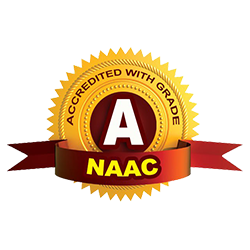

 1800-180-5522
1800-180-5522